Cracking the Case on Rural Crime
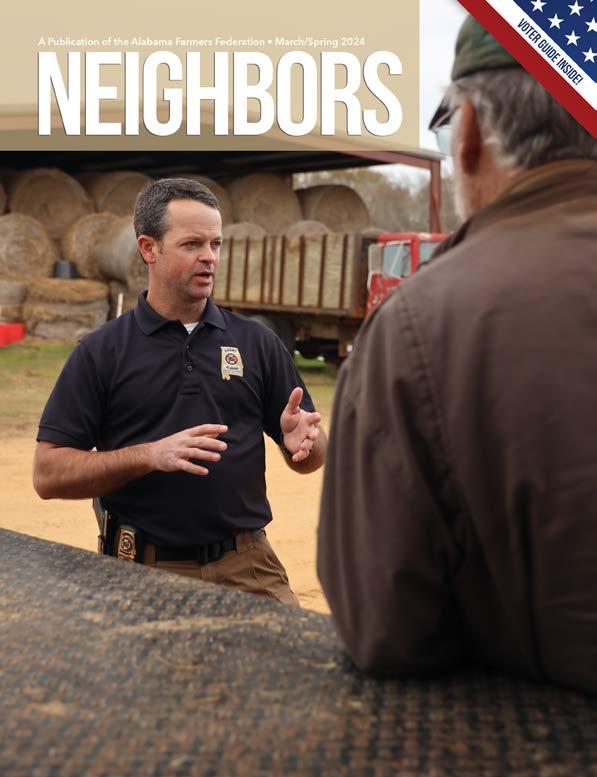
Down on Main Street
CELEBRATE National Peanut Month

March/Spring 2024 | Volume 49 | Number 2
Marlee Jackson | Editor
Laura Unger | Graphic Designer
ALABAMA FARMERS FEDERATION
Paul Pinyan Executive Director
Jeff Helms | Director of Communications
FEDERATION OFFICERS
Jimmy Parnell | President, Stanton
Rex Vaughn | Vice President | North, Huntsville
Jon Hegeman Vice President | Central, Anniston
George Jeffcoat Vice President | Southeast, Gordon
Jake Harper | Vice President | Southwest, Camden
Steve Dunn Secretary-Treasurer, Evergreen
DIRECTORS
Dorman Grace | Jasper
Jeff Peek | Athens
David Bailey | Dawson
Steve Lake | Vinemont
Joe Anders Northport
Phillip Hunter | Birmingham
Joe Lambrecht | Wetumpka
Tommy Martin | Moundville
Bill Cook Montgomery
Trip Horne | Louisville
Mark Kaiser | Daphne
Jerry Peak | Chancellor
Debbie Dunn Samson
Dillon Turk | Semmes
Neighbors (ISSN 0162-3974) is published monthly by the Alabama Farmers Federation, 2108 East South Boulevard, Montgomery, Alabama 36116 or (334) 288-3900. For information about Alabama Farmers Federation member benefits, visit the website www.alfafarmers.org. Periodicals postage paid at Montgomery, Alabama, and additional mailing offices.
Printed in the U.S.A.
POSTMASTER
Send address changes to Neighbors P.O. Box 11000, Montgomery, Alabama 36191-0001
MEMBERSHIP AND SUBSCRIPTION CHANGES 800-392-5705, Option 4 or BWatkins@alfafarmers.org
ADVERTISING REPRESENTATIVE
Ben Shurett, (256) 997-7922
BenShurett.alfafarmers@gmail.com
DISCLAIMERS: Advertisements in Neighbors do not represent an endorsement by the magazine or Alabama Farmers Federation. Editorial information from sources outside the Alabama Farmers Federation is sometimes presented for our members. Such material may, or may not, coincide with official Alabama Farmers Federation policies. Publication of information does not imply an endorsement by the Alabama Farmers Federation. www.AlfaFarmers.org


 Photo By Marlee Jackson
Photo By Marlee Jackson


A member of American Farm Bureau Federation
4 In This Issue 4 | Main Street Alabama Helps Businesses Boom 7 | Extra-Special Students Cultivate Strong Ag Skills 8 | WLC Leaders Look Back on Legacy of Service 17 | Ag Law & You: Legal Lingo 20 | Alabama Leaders Network at National Farm Meeting 23 On The Cover The State Bureau of Investigation (SBI) in cracking down on rural crime thanks to special agents like Chase Chapman. Victims are encouraged to report crime with local authorities before contacting SBI’s hotline.
28 | Peanut Recipes Pack Powerful Punch 28 20 alfafarmers.org March/Spring 2024 | NEIGHBORS | 3
Main Street Alabama Brings


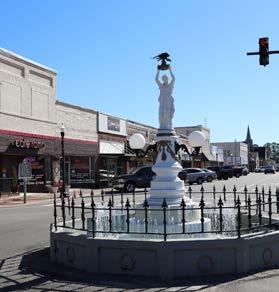
Clockwise from top right: Chuck Clark of Clark’s Leather Works has found a work home in downtown Enterprise’s Small Box Shop; The Boll Weevil Monument is the foundation of Main Street Enterprise; Coffee County Farmers Federation Vice President Max Bozeman supports peanut farmers (like himself) and small businesses in the area; Kendra Wester, owner of Boll Weevil Soap Co., and Main Street Enterprise Executive Director Mariah Montgomery are proud of the UnBollweevible lotion scent; Fear No Weevil is a common saying displayed on bags, shirts and signs in downtown shops.
Communities like Enterprise in Coffee County are embracing deep roots through revitalization.
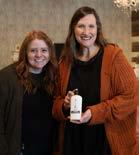 By Maggie Edwards
By Maggie Edwards
Creating jobs and preserving character is at the heart of Main Street Alabama.

“Main Street Enterprise is centered around the boll weevil and what it means to us,” said Main Street Enterprise Executive Director Mariah Montgomery. “The boll weevil represents overcoming adversity.”
Main Street Enterprise’s motto — Deeply Rooted, Ever Rising — is a callback to the early 1900s when the boll weevil devastated Wiregrass cotton.
becomes a temporary shop until owners find brick-and-mortar locations downtown, Montgomery said.
“Being in the Small Box Shop has given people a better opportunity to see all that I offer,” said Chuck Clark of Clark’s Leather Works. “This entire area has made subtle changes that draw people in.”
Coffee County Farmers Federation (CCFF) President Carl Sanders said the revitalization reminds him of his childhood when businesses boomed.
“Almost everything moved out, but now things are coming back,” he said.
The community is centered around its agricultural heritage, said CCFF Vice President Max Bozeman.
“They are selling the products we produce right here,” he said while holding up peanuts from Weevil Nut Co.

“We raise awareness of downtown markets, help businesses stay profitable and strive to keep the feeling of a commercial district,” said Main Street Alabama State Coordinator Mary Wirth. “Downtown is a place where everyone feels like it’s their own. Our job is to bring that back to life.”
Since 2009, the nonprofit has helped over 30 communities or “Main Streets” restore the core of downtowns through grants and formal community support.
“Our shop joined the city’s 100th celebration of the Boll Weevil Monument in 2019,” said Kendra Wester, who owns Boll Weevil Soap Co. “We renamed our South Alabama Cotton scent ‘UnBollweevible.’ It’s a story of how a challenge turned into a win.”
Wester credits Main Street Alabama for giving Enterprise a new perspective. Community over competition is the mentality, she said.
Another victory came when Enterprise received a grant from the U.S. Department of Agriculture. This provided a shipping container that
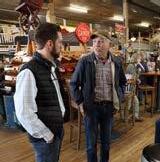

Alabama-themed gifts.
 Clockwise from top right: LCFF President Jeff Peek visits the Athens Farmers Market; Athens’ mural celebrates agriculture; Alabama Farmers Federation Area 1 Organization Director Barrett Gilbert and Wes Isom visit at U.G. White Mercantile; The old-timey store displays
Clockwise from top right: LCFF President Jeff Peek visits the Athens Farmers Market; Athens’ mural celebrates agriculture; Alabama Farmers Federation Area 1 Organization Director Barrett Gilbert and Wes Isom visit at U.G. White Mercantile; The old-timey store displays
4 | NEIGHBORS | March/Spring 2024 alfafarmers.org
Heart to Communities
Agriculture is on the mind of Athens Main Street, too.
“Athens is a quaint town, but if you go back in history, it’s an agricultural town,” said Limestone County Farmers Federation (LCFF) President Jeff Peek, who also serves on the Alabama Farmers Federation state board.
LCFF recently stepped in to help Athens Main Street revamp the Athens Farmers Market.
“We want people to understand how important agriculture is to this area,” Peek said. “With a growing population and more infrastructure, farmers have pushed toward agritourism. This is somewhere people can bring things to sell but also advocate for the industry.”
Revitalization downtown benefits farmers because everything is connected to agriculture, said Athens Main Street board member Michelle Williamson.


“Farmers’ products are in restaurants and stores like U.G. White,” Williamson said. “We’re also enhancing things that have already been established.”
After 107 years in business, U.G. White Mercantile gives Athens a historical presence.
“We’re critical in saving the old way of life,” said U.G. White owner Derrick Young. “We try to create an

atmosphere with unique products you don’t find anywhere else. The entire downtown is authentic.”
Over the past seven months, five restaurants have moved into downtown Athens. A record number of attendees have shown up for events, too.
“The business owners have done a huge amount of work to stay open, but Main Street has focused attention on bringing more people downtown and making them aware of the things happening,” Young said. “When people see growth patterns, they are willing to take the risk and come be a part of it.”
Back south in Monroe County, Monroeville Main Street centers attention on its literary legacy. It’s the hometown of famed author Harper Lee.
“We are the Literary Capital of Alabama,” said Anne Marie Deas Bryan, executive director of Monroeville Main Street. “We always have a tourism element because our courthouse is a national landmark. Everything we do in our historic district supports that.”
Restaurants, massage therapists, luxurious Airbnbs, gift shops, a literary trail and the iconic “To Kill a Mockingbird” play make up that downtown experience.

The city’s investment in itself is paying off. In May, Monroeville Main Street will be honored as Alabama’s first semifinalist for the Great American Main Street Award. The winner will be announced during the national conference Birmingham.
“This could not be more special for us,” Bryan said. “It’s a big deal to be considered one of the top eight programs in the nation. We’re ready to show off our state.”
Visit MainStreetAlabama.org to find
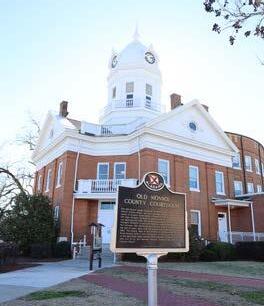


Scan to learn more about Monroeville! See more about the city of Athens on Simply Southern TV. alfafarmers.org March/Spring 2024 | NEIGHBORS | 5
Clockwise from top: Old Monroe County Courthouse is a national landmark and houses the county museum; A literary trail was created downtown to allow visitors to read sections of a book as they walk the square; Sculptures surround Monroeville Main Street to honor its literary legacy.

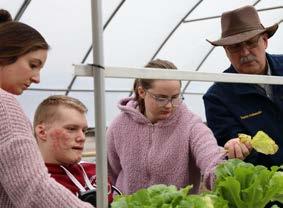 By Tanner Hood
By Tanner Hood
Jeff McKinney stands in a greenhouse filled with fresh lettuce, corn, tomatoes, potatoes and peppers while teaching an extra-special group of students the importance of agriculture.
“I realized there was a particular group not being served,” said McKinney, an agriscience teacher at Haleyville High School in Winston County. “It wasn’t anyone’s fault, but they weren’t provided some of the same classroom experiences as others.”
These high schoolers have mental or physical disadvantages or disabilities. They’re also part of a transition program cultivating skills needed for life after graduation.
Agriculture-based lessons are thanks to McKinney and special education teacher Alyssa Elliot. McKinney said his original goal was to help students benefit from learning the basics of growing plants and raising animals.
“We teach them hands-on skills like running a cash register, doing a point of sale, scheduling on a calendar, working with customers and how to make change,” McKinney said. “It has evolved to more than plants. We teach them about animals and woodworking as well.”
Elliot shares McKinney’s enthusiasm.
“We incorporate a lot of transition, which is getting them ready for outside life, for maybe doing a job,” she said. “We’re exceeding limits, going above and beyond, and having fun.”
Joshua Criddle is an example of students pushing the barrier. Criddle’s legs and arms never fully developed. He instead uses innovative maneuvers,
Extra-Special Winston County Students Cultivate Real-Life Skills
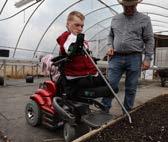
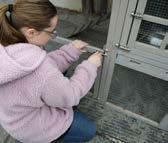
determination and McKinney’s encouragement to plant and water seeds in the greenhouse. It’s an activity he said he loves.
McKinney said several students have amazed themselves at what they can do and are stepping outside their comfort zones in other areas. This includes Criddle. Though naturally shy, he has blossomed under the program’s influence and now speaks in front of other classes and groups.
Criddle’s message is simple: “Try your best. Don’t give up. Don’t say, ‘I can’t.’”
In addition to plants, the class has a flock of chickens. Another student, Amber Springer, said she’s fond of her new feathered friends.
“I want to chicken farm,” Springer said. “I want a bunch of them. I like to feed, water and play with them.”
McKinney said it’s encouraging to see the students become partial to poultry.
“We affectionately refer to the kids as ‘chicken tenders,’” McKinney said. “They’re required to care for the chickens every day. The students not only feed and water, but they must
pick them up and examine every single chicken.”
The program hasn’t been without challenges. McKinney and Elliot said learning levels vary among students.
“We try to find what they can and will do and capitalize on that,” McKinney said. “There’s a lot of trial and error, but these aren’t issues. They’re opportunities to better ourselves.”
Elliot said community support has been amazing to witness. A top supporter is Winston County Extension Coordinator Zack Brannon, who helped secure a grant to provide a hydroponic system for the school’s greenhouse.
“Mr. McKinney told me what these students were doing, and I wanted to help,” said Brannon, a Winston County Farmers Federation board member. “I love everything about this program.”
McKinney believes the connections between Brannon and the class have been more than coincidental.
“It’s amazing how God has connected us all together,” McKinney said. “He has pulled us all toward this common goal of helping students better themselves.”
alfafarmers.org March/Spring 2024 | NEIGHBORS | 7
Top left: Jeff McKinney and Alyssa Elliot teach students Joshua Criddle and Amber Springer about growing hydroponic lettuce in the greenhouse at Haleyville High School. Above left: Criddle demonstrates his ability to innovatively plant seeds. Right: Springer opens the chicken coop she and fellow students assembled during agriscience classes tailored for those with special needs.
Leading Ladies: Women’s Committee Chairs Reflect on Service
By Marlee Jackson
Since 1965, forty-four women have had a special seat at the table empowering thousands of county volunteers integral to Alabama Farmers Federation success.
They’re State Women’s Leadership Committee (WLC) chairs — and they’ve led by example.
From inaugural chair Mabel McDole of Limestone County to current leader Debbie Dunn of Geneva County, their work has reflected county committees’ priorities, projects and programs.
That includes organizing political forums, hosting farm days, coordinating pop tab collections and encouraging public service work. They promote homegrown values in the State House; serve as Alabama FarmPAC trustees; and lead county boards and committees.
They also organize popular cooking contests, sewing and decorating competitions, and agricultural literacy events, in addition to serving an ex-officio term on the state board.
These mighty members’ hospitality, helpfulness and hard work create what is arguably the “secret sauce” critical to sharing the Farming Feeds Alabama message across ages.
Federation Women’s Leadership Division Director Kim Earwood praised volunteers for their enthusiasm, whether meeting political candidates, attending the Women’s Leadership Conference or donating accurate ag books to libraries.
“It is truly amazing the breadth and depth of work our ladies accomplish each year,” said Earwood, who began working with the State WLC in 2005. “They know what it means to have a servant’s heart. County and State Women’s Leadership Committee members make an incredible impact in their communities. They are rooted in conservative values but also know the importance of innovating with the times. We are proud of their accomplishments.”
The reflections of three former state chairs follow. These leading ladies represent just a fraction of the Federation’s savvy, service-oriented volunteer-leaders, but Earwood said there’s always room for more.
Get plugged in at AlfaFarmers.org.
Scan to see State WLC chairs:

“


Rita Garrett CHEROKEE COUNTY
Lord, help me do this.”
Rita Garrett whispered that prayer before stepping up to podiums and presiding at meetings in 2012 — a key part of her duties as State WLC chair.
“I am timid,” said Garrett of Cherokee County, whose cheery, confident personality seems in contrast with that self-assessment. “You get me in front of a crowd and I am.”
While serving on the State WLC pushed Garrett out of her comfort zone, it also broadened her view of the Alabama Farmers Federation’s purpose.
“I learned more about the role of the directors’ work, what an important role it is,” Garrett said. “They’re making serious decisions that affect farmers everywhere.”
Those farmers included her husband, Donnie. He grew cotton and soybeans and was a state board member prior to Garrett’s year as chair.
Donnie was his wife’s greatest supporter, too. He passed in 2022 after 47 years of marriage.
Today, Garrett juggles work crunching numbers for the farm, serving as assistant clerk for the city of Centre and being “Mims” to grandchildren Beau and Jett. She’s also encouraging daughter Andrea and son-in-law Jeff to craft friendships across commodities, counties and state lines through Federation involvement.
“You just become one big family,” Garrett said.
One of her fondest Federation family memories included welcoming the State WLC to Centre for the annual planning retreat. The weekend coincided with the local fall festival — and her fellow committee members were set on participating in the parade.
“Donnie got out his antique John Deere tractor and fixed up a trailer with hay. Delle Bean (of Calhoun County) drove the tractor, and we were all in the parade with our Alfa shirts and our little waves,” Garrett remembered with a smile. “Some of the women said it was the best retreat we’d ever had. It was so laid back.”
8 | NEIGHBORS | March/Spring 2024 alfafarmers.org


Cheryl Lassiter was flying solo when she attended her first Women’s Leadership Conference.
But a willingness to laugh, chat and sit with strangers helped her leave that Alabama Farmers Federation meeting with friends from across the state.
“When you’re the only one there from your county, you have to sit with women from different counties,” Lassiter said. “It’s really more fun that way.”
Since those early days of Federation involvement with husband Jeff, the cattle-raising couple has built even deeper relationships with farmer-friends beyond Choctaw County.
That’s partially thanks to the State WLC, which Lassiter ran for in 2011 once her three daughters were grown. Debbie Freeland from nearby Mobile County encouraged her. Those next six years of service were an honor, Lassiter said.
“I had no idea what to expect. Working in forestry, I didn’t really work with a lot of women,” said Lassiter, who managed a timber company office. “The first meeting, my nerves were out the window. I became friends with all of them. When you meet all these women, it’s like friendships that never end.”
Those friends nominated Lassiter to lead the committee in 2015. As chair, she hit the road attending state board meetings, speaking at events like Ag in the Classroom Summer Institute and representing Alabama during national conventions.
She also refined her take on WLCs’ mission — to encourage, offer fresh perspectives and promote agriculture.
It’s what she still accomplishes through Choctaw County’s small-but-mighty WLC. Members frequently help with ag days and mock interviews for FFA officers. That investment will pay dividends growing the Federation’s family tree, Lassiter said.
“Little things can make a big difference,” she said. “The Farmers Federation has always been a big family for us.”
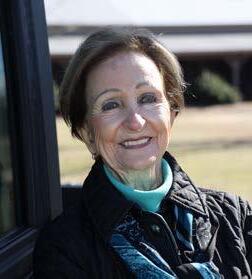
After six decades married to a cotton farmer, fluffy white lint is Jamie Lazenby’s irrefutable fiber of choice.
Equally undeniable is the leadership woven into the fabric of her life.
“I’m not a follower. I’m a leader,” said Lazenby of Lee County. “I don’t know why, but I’ve always fallen into that role.”
Lazenby’s personality made her a perfect pick when the Lee County Farmers Federation (LCFF) needed a WLC chair in the late ‘70s. She led the group nearly 20 years.
“They kept saying, ‘We will do anything you ask, just please be the chair,’” Lazenby reminisced. “And they did. We got along beautifully.”
Projects focused on helping their community, from food bank donations to collections for women’s shelters. Lazenby’s service went statewide in the ‘90s when she was elected to the Alabama Farmers Federation State WLC.
As State WLC chair in 2000 and 2004, Lazenby developed a passion for promoting conservative candidates. She and husband Harry still welcome politicians to their Lazenby Farms outside Auburn, discussing priorities under centuryold pecan trees or in knee-high cotton.
Though daily operations of the farm and their La-Z-Bee gas station have passed to the next generation (they have three children and 10 grandchildren), the Lazenbys remain fixtures at Federation meetings. Lazenby is an Alabama FarmPAC trustee and was LCFF’s first female president, serving from 2019-2023.
She tickles the ivories at Mount Olive Baptist Church, too, only missing for vacations and Federation meetings, she said with a smile.
It’s comical considering Lazenby, who was raised on a farm, never meant to marry a farmer.
“The Lord knew more than I did,” she said. “Harry often says if I hadn’t married a farmer, I wouldn’t have had all these opportunities. He’s right.”
Cheryl Lassiter
alfafarmers.org March/Spring 2024 | NEIGHBORS | 9
Jamie Lazenby CHOCTAW COUNTY LEE COUNTY

Alabama Cowboy Rides High at NFR
By Tanner Hood
Banging chutes, bellowing cattle, loud music and flying dirt filled the air around Alabama cowboy Nelson Wyatt as he competed at the 2023 Wrangler National Finals Rodeo (NFR).
Wyatt, a header in the team roping competition, didn’t let the bright lights of Las Vegas hinder his performance at the NFR in December.
“This is the biggest 10 days for us in a year,” said Wyatt of Clanton in Chilton County. “The stakes are high. I wanted to not get caught up in the moment and do my job.”
The job? Rope a cow by the horns or head and turn it across the arena for his partner, Jonathan Torres, to rope the feet in the quickest time possible. At the 2023 NFR, Wyatt and Torres did this 10 times over nine days against the 14 other best duos in the world.
Wyatt said encouragement from others pushes him through the tough moments.
“There are 14 other teams doing the same thing, and it makes it difficult to win,” Wyatt said. “I go back to the support I get from everywhere. It’s cool to feel everyone cheering from home with messages and calls.”
That backing is visible on Wyatt’s
shirt every night in the form of a bright red, embroidered block patch. The Alfa logo represents home, said fellow Chilton County native Jimmy Parnell.
“We’re happy to support Wyatt and enjoy seeing the success he’s had,” said Parnell, a cattle farmer and president of the Alabama Farmers Federation and Alfa Insurance. “We’re thankful for his willingness to support Alabama farmers and promote them across the country.”
Wyatt’s success has been a long time in the making but isn’t surprising. His father taught him how to rope at a young age. Wyatt then competed in amateur and college rodeos until he moved to Texas in 2017 to begin rodeoing professionally.
“I started later than most,” Wyatt said. “Out here, people start when they’re 18 and make the NFR early. I guess I’ve felt behind because of my late start.”
Despite the delay, Wyatt went on to win rookie of the year among headers in 2017, won big rodeos along the way and competed in his first NFR in 2020. NFR participants consist of the top 15 money-earners in their competition throughout the year. Wyatt entered the 2023 NFR at 3rd and went on to place in six rounds. He won Round 10.
Even with all the success, Wyatt hasn’t forgotten his roots — and those
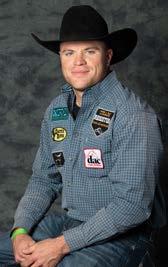
who’ve always had his back.
“It means a lot to have Alfa’s support and be part of the organization,” Wyatt said. “I’m appreciative to Alfa, and I’m pleased to represent them nationally.”
PRCA PHOTO BY CLICK THOMPSON
Nelson Wyatt is a professional cowboy from Clanton who competed in the 2023 Wrangler National Finals Rodeo. Wyatt and teammate Jonathan Torres placed in six rounds and won Round 10. Wyatt is sponsored by Alfa Insurance.
Nelson Wyatt, right, roped a steer in Round 9 of the 2023 Wrangler National Finals Rodeo in Las Vegas for partner Jonathan Torres, left. Wyatt is sponsored by Alfa Insurance.
10 | NEIGHBORS | March/Spring 2024 alfafarmers.org






Schedule Your Appointment Today (877) 682-7837 REFERRAL CODE : ALFFNWI23 greathearingbenefits.com/farm-bureau/alabama THE BEST DEAL ON HEARING AIDS AND CARE Welcome Alabama Farmers Federation Members As a member of the Alabama Farmers Federation, you have access to the Great Hearing Benefits (GHB) program. GHB provides family members access to hearing care and hearing aids at discounted rates. © 2023 GN Hearing A/S. Great Hearing Benefits is a registered company owned by GN Hearing A/S. All rights reserved. 1 Deductible required. 2 Immediate family members include father, mother, husband, wife, son, daughter, brother, sister, grandfather, grandmother, father-in-law, mother-in-law, sister-in-law, brother-in-law, and domestic partner and civil unions recognized under State law. 40% OFFonJab ioProducts Member SavingsUpTo Get up to 50% Off Prescriptive Hearing Aids Free 60-Day Hearing Aid Trial Share Your Benefits2 with up to 3 family members 3-Year Warranty and Service1 5,000+ Locations Nationwide When you do business with Alabama Ag Credit, we put cash back in your pocket. We are excited to return nearly $12.1 MILLION in CASH to our customers based on our 2023 earnings. alfafarmers.org March/Spring 2024 | NEIGHBORS | 11




"Everything we do on a day-today basis is what keeps us going, so it is important for young, beginning, or small farmers to remember that."
-Ben Brown AFC Member

Hear from our members.


Together we grow. ALABAMAFARMCREDIT.COM

 By Marlee Jackson
By Marlee Jackson
Eighteen guest workers arrive at Martin’s Nursery in Mobile County each January to cultivate ornamental plants that will beautify homes across the U.S.
They’re also working to improve life in their native countries.
“They don’t have the opportunities back home that they do here,” said Dillon Turk, whose family owns the nursery in Semmes. “They can work all day back home and make a fraction of what they make here. That’s if they can find a job.”
Alabama Extension’s Beau Brodbeck gets it. His recent research analyzed the impact regular, temporary migration to the U.S. and Canada (like agricultural H-2A or nonagricultural H-2B programs)
H-2A Program Benefits Guest Workers, Alabama Farms
The top reason fueling temporary migration? Improving livelihoods.
That’s according to a staggering 90% of respondents.
In Guatemala, workers average $5 to $10 a day. In contrast, an eight-hour workday for guest workers in Alabama yields $117.44, due to the federally mandated Adverse Effect Wage Rate (AEWR). Alabama’s current AEWR is $14.68 an hour.
Those funds go far in developing economies like Guatemala.
According to Brodbeck’s research, guest workers send $770 to $1,900 home each month. It’s a key source of income for workers, families, communities and the country — and means H-2A visas can significantly improve short- and long-term livelihoods compared to non-emigrants and irregular (or illegal) migrants.
Examples include improved housing opportunities, better education for the next generation and investments in businesses or farms.
Turk has heard about those investments firsthand. Martin’s Nursery contracts with Mexican and Guatemalan guest workers, one of whom recently finished building his fourth rental house back home. Although he’s in Semmes pruning plants and pulling orders 10 months a year, he’s a landlord, too.
“We direct deposit their paychecks, which streamlines their ability to get money back home to their families,” said Turk, the Alabama Farmers Federation’s
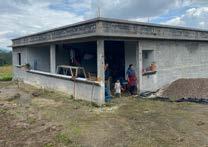
“They’re happy to be home in the winter, but they also say they’re ready to come back here and work.”
Other advantages of regular migration include lower costs, plus decreased travel risks. The average work visa costs about $1,000 and is often paid for by the contracting farm. Irregular migration can cost up to $15,000 and lines the pockets of traffickers. It’s also dangerous, as traffickers duck and dodge mainstream routes into the U.S.
Brodbeck’s research delivers numbers to back up decades of anecdotal information, said Blake Thaxton, a commodity director with the Federation. He works with specialty crop farmers like Turk.
“Our farmers have said for a long time that guest worker programs are mutually beneficial,” Thaxton said. “It’s comforting to know the work these guys do pays off for Alabama farms, families who use their crops and the guest workers who help grow them.”
It’s critical to remember why farmers invest in guest worker programs, too, Turk said.
“Just because most Americans don’t want to take that job doesn’t mean there aren’t people willing to take the job,” he said. “We need the help, and they appreciate the opportunity.”
This is the final piece in a four-part series highlighting Alabama’s need for guest workers. Find previous stories at AlfaFarmers.org.


 Guest workers are able to improve their livelihoods back home thanks to work in the U.S. That includes investing in their homes, education, farms and other small businesses.
Guest workers often take on tough manual labor in the U.S. That labor then pays off in their native countries, like Guatemala, as investments are made in infrastructure.
Beau Brodbeck, center, is pictured with a family that invested funds into a local pizza shop in Guatemala.
Guest workers are able to improve their livelihoods back home thanks to work in the U.S. That includes investing in their homes, education, farms and other small businesses.
Guest workers often take on tough manual labor in the U.S. That labor then pays off in their native countries, like Guatemala, as investments are made in infrastructure.
Beau Brodbeck, center, is pictured with a family that invested funds into a local pizza shop in Guatemala.
Scan to see Brodbeck’s in-depth research alfafarmers.org March/Spring 2024 | NEIGHBORS | 13
Dillon Turk, right, works hand-in-hand with guest workers on his family’s Martin’s Nursery in Semmes.
Alfa Answers Call as Storms Strike South Alabama
 By Brooke Foster
By Brooke Foster
Damaged buildings, debris and rubble were among the wreckage left after a tornado struck Houston County Jan. 9.
Shortly on the scene, too, was Alfa Insurance Agent Robert Johnson. The Dothan agent said customers in his area received a 5:30 a.m. wake-up call in the form of sirens and found a trail of destruction later that morning.
Clinic,” Johnson said. “The entire front part of the building was destroyed. Fortunately, the staff were hunkered down and safe.”

“The first thing I prayed was for everyone to be safe. I was hopeful necessary precautions were taken in preparation of the storm to prevent extensive damage to homes and property,” Johnson said. “Once we got the ‘all clear,’ I started making my way to customers who were in the path of the storm.”
Alfa customers experienced widespread damage. This included a collapsed roof with rafters puncturing the inside of a home, fallen trees on roofs and outbuildings stripped of metal walls. The storm wasn’t selective. Brick-and-mortar homes, modular homes, barns and a commercial building were impacted.
“The most significant damage I witnessed was to Cottonwood Animal
Preparation
Johnson said when a storm is on the horizon, he makes every effort to help customers by sharing preparedness tips on social media and in person. He often reminds them small tasks can help reduce severity of potential damage. This includes cutting tree limbs, securing outside patio furniture and checking windows for leaks or cracks.
Recovery
While Johnson helped customers survey damage after the storm, questions popped up about next steps.
“As I made my way to customers’ homes, I started assessing the damage to get the claims process started and ensured customers their homes and property would be taken care of,” Johnson said. “I also advised everyone to make sure they were protecting their home from further damage after the storm, making sure there’s no intrusion of water or broken windows.”
Johnson said he takes his role as an insurance professional seriously.
“As an agent, my job is to look out for my customers,” Johnson said. “It’s being there not only after the storm but making sure they’re prepared beforehand, too.”
Following the Jan. 9 event, Johnson’s office processed more than 250 of the 700 total claims from the Dothan area. An additional 800 claims were filed through Alfa across Alabama, bringing the total to more than 1,700 claims costing over $35 million.
“I think that total speaks volumes to what our team is capable of,” said Alfa District Claims Manager Ryan Pezent. “Our agents and adjusters have boots on the ground as soon as a major storm blows through, working together to ensure customers are OK and assessing the damage as much as we can ourselves. That’s the Alfa difference.”
To understand Alfa’s claims process, visit tinyurl.com/AlfaClaimsProcess.
 Cottonwood Animal Clinic experienced significant damage Jan. 9 when a tornado destroyed the front part of the building.
Dothan Alfa Agent Robert Johnson was quick to answer the call and check on his customers after a tornado tore through Houston County Jan. 9.
Cottonwood Animal Clinic experienced significant damage Jan. 9 when a tornado destroyed the front part of the building.
Dothan Alfa Agent Robert Johnson was quick to answer the call and check on his customers after a tornado tore through Houston County Jan. 9.
14 | NEIGHBORS | March/Spring 2024 alfafarmers.org
Johnson



•



Cultivating meaningful life on and off the farm.

Perseverance
Family • Integrity •
Stewardship • alfafarmers.org March/Spring 2024 | NEIGHBORS | 15

Legal Dictionary: The Language of the Law
The law is not always easy to understand. Lawyers have made a living deciphering legalese for years. Though it is still always best to consult a lawyer with legal questions, this short guide provides helpful pointers when it comes to legal terminology.
THE TRIAL
The trial is where the legal “action” begins. This is the first step in resolving a lawsuit.
Trial court | the location where a lawsuit begins, hearings take place and, potentially, juries hear arguments
Plaintiff | the person suing
Defendant | the person being sued
Plaintiff’s attorney | attorneys who may specialize in serving plaintiffs; build cases against individuals or businesses who may have harmed another Defense attorney | attorneys who tend to specialize in defending individuals or businesses being sued
Complaint | the actual document filed with the court and served to the defendant laying out accusations, harm done and relief sought by the plaintiff Response | a document that must be filed by the defendant detailing defenses to the accusations; can potentially include a counterclaim (where the defendant sues the plaintiff)
Default judgment | a ruling made against the party that fails to show up; this is why it’s important to always appear in court if suing or being sued
THE APPEAL
During an appeal, the results of a trial court can be challenged and potentially overturned. Most states have an appellate court to hear appeals from the trial court. The state supreme court hears appeals from those appellate courts as cases work through the system.
Appeal | when a party asks the court to reconsider the results of a trial court or a ruling from a lower court
Appellant | the person appealing (asking for a change) in the way a court has ruled
Appellee | the person asking the court to keep in force the way the court ruled
Holding | the result of an appeal, what the court says about an issue and the way it decides a case
THE LAW
These terms describe the law.
Statute | generally, a law or policy adopted by a legislative body, like the Alabama Legislature or U.S. Congress
Regulation or rule | a statement that has the force and effect of a law but is adopted by an agency rather than a legislative body
Code | a collection of statutes or regulations, usually organized by topic
Case law | law that does not come directly from written law but can be inferred by reading previous decisions of courts to interpret an outcome
THE LATIN
Like medicine and other professions, Latin is used in the legal system. The American legal system is based on the historic English legal tradition which, in turn, was based on the Roman system of law. Therefore, U.S. courts occasionally use the language of ancient Rome: Latin.
Certiorari | when a supreme court grants the requesting party a hearing of their case
Starre decisis | a principle which courts follow that notes they must respect the decisions previous courts have made on similar issues
Pro bono | legal assistance free to the recipient
Amicus curae | a friend of the court; this usually comes in the form of a brief, filed on behalf of a party a third party is supporting
Pro se | an individual representing themselves, rather than using an attorney
The language of the law is vast, and even lawyers sometimes consult a dictionary. A popular legal resource is Black’s Law Dictionary. A free version can be found online. It includes more information about legal words and concepts.
The material presented above is for educational purposes only. The content does not constitute legal advice. If readers require speci c advice or services, a lawyer or other professional should be consulted.
alfafarmers.org March/Spring 2024 | NEIGHBORS | 17


Young Farm Family, Convention Delegates Lead Alabama to New Frontiers

 By Maggie Edwards
By Maggie Edwards
New frontiers, new prize packages and new policy highlighted the experiences for Alabama farmers during American Farm Bureau Federation (AFBF) Annual Convention Jan. 19-24 in Salt Lake City, Utah.
Brady and Anna Peek of Limestone County claimed third place in the AFBF Achievement Award contest for the nation’s top young farm families. This is the second consecutive year Alabama’s representatives have finished in the Top 3.
“It’s an honor,” said Brady, a row crop farmer. “Everyone there was deserving. To be there was humbling, but to farm every day is humbling as well. We didn’t know if that would be possible. To be recognized as outstanding is icing on the cake.”
As third-place honorees, the Peeks received a $2,500 Investing in Your Future grant from AmericanAg; $2,500 in merchandise from Stanley Black & Decker; and a safe sponsored by
Case IH. They qualified for the national contest after winning the Alabama Farmers Federation’s Outstanding Young Farm Family competition last summer. Their state prize package was worth nearly $80,000, thanks to sponsors Alfa Insurance, Alabama Ag Credit, Alabama Farm Credit, John Deere, SunSouth and TriGreen.
Federation President Jimmy Parnell praised the Peeks for their dedication to agriculture and the organization.
“Brady and Anna are the definition of what the New Frontiers convention theme means to Alabama,” Parnell said. “I’m convinced that the new frontier is the old frontier. The things that made America great came from agriculture, and that is what I want us to focus on as we look at our new frontier.”
That agricultural focus propelled the Peeks to this accomplishment, said Federation Young Farmers Division Director Hunter McBrayer.
“Brady has a willingness to do things differently,” McBrayer said. “He has been able to chart his own course. We’re incredibly proud of him and Anna.”

The Achievement Award recognizes Young Farmers for Farm Bureau involvement on the national, state and local levels; farm growth; and financial success.
National involvement for Brady included voting in the business session at the 2021 AFBF Annual Convention. That’s where grassroots policy shines, Parnell said.
On Jan. 23, Alabama’s 19 voting delegates joined 327 others from across the country to adopt policy that will impact decisions in Washington, D.C.
The session included Parnell’s reelection to AFBF’s board of directors and the reelection of AFBF President Zippy Duvall. The Georgia farmer has led the nation’s largest farm organization since 2016.
“I am first a farmer, but I realize the importance of what this job can do for
20 | NEIGHBORS | March/Spring 2024 alfafarmers.org

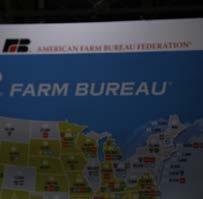
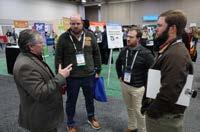


rural America and our farmers,” Duvall said to the delegate body. “I love this organization, and I will defend it as long as I can. This country’s future depends on the men and women who you all represent.”
Duvall’s earlier presidential address challenged thousands of AFBF members to be engaged.
“Leadership starts with each of us,” he said. “It doesn’t matter your title, or how young or how old you are. You can help chart the path to new frontiers for Farm Bureau and for our communities. The task is too big for anyone to tackle alone, but together, we can reach the summit.”
A convention high point was Federation Wildlife Division Director William Green’s presentation on the Cultivation Stage. Green’s session, From Feral Hogs to Hungry Deer: Wildlife Damage Considerations for 2024, was a farmer favorite during the trade show. Topics covered the latest tips for farmers
dealing with production losses due to native and invasive species.
Additionally, Limestone County’s Greyson Lauderdale represented Alabama in the Discussion Meet competition, while Jonathan and Sara Sanders of Coffee County finished their term on AFBF’s Young Farmers & Ranchers Committee.
The state’s youth organizations were in the spotlight, too.
Alabama 4-H Ambassador President Gavin Yocom of Shelby County and Alabama FFA President Kayden Ray of Tallapoosa County attended leadership development workshops where they connected with other students, developed a better understanding of Farm Bureau and deepened their knowledge of the Young Farmers program.
Other convention highlights included speeches from U.S. Secretary of Agriculture Tom Vilsack, speaker and visionary Jack Uldrich and famed coach


and consultant Greg Harden; the Annual Meeting of Farm Bureau Women; and the announcement of the 2024 Book of the Year, “My Grandpa, My Tree, and Me.”
Vilsack announced the U.S. Department of Agriculture’s plan to invest millions in renewable energy and domestic fertilizer projects. This is projected to lower energy bills, generate new income, create jobs and strengthen the competitive edge of U.S. farmers, Vilsack said.
The Federation was also honored for outstanding achievements in all four Awards of Excellence categories: Advocacy; Coalitions & Partnerships; Engagement & Outreach; and Leadership & Business Development.
“Alabama is ready for new frontiers,” Parnell said. “Being surrounded by almost 5,000 farmers gives me hope that American agriculture is continuing in the right direction.”
alfafarmers.org March/Spring 2024 | NEIGHBORS | 21
Clockwise from top right: Limestone County’s Greyson Lauderdale competed in Discussion Meet; Jonathan Sanders of Coffee County finished his and wife Sara’s (not pictured) term on the AFBF Young Farmers & Ranchers Committee; Alabama 4-H Ambassador President Gavin Yocom, left, and Alabama FFA President Kayden Ray, right, visited the trade show with Federation President Jimmy Parnell; Brady and Anna Peek of Limestone County placed third in the Achievement Award contest; Nineteen Alabamians voted during the business session; Parnell carried Alabama’s flag during General Session 1; The Federation’s William Green presented on the Cultivation Stage; Alabama had eight representatives during the Annual Meeting of Farm Bureau Women; At the trade show, North Dakota Farm Bureau President Daryl Lies, left visited with Federation Central Area Vice President Jon Hegeman, Federation Young Farmers Division Director Hunter McBrayer and State Young Farmers Committee Chair Dillon Turk of Mobile County.


























Contact your local Alfa Insurance o ce and apply today! *Rates disclosed as Annual Percentage Rate (APR) and are subject to change without notice. APRs will vary with the market based on the Prime Rate. Introductory APR is applicable for first 9 months from account opening date. After that, your APR will return to the current rate indicated on your statement. If timely payments are not received, the introductory APR may end early. 1Eligible purchases mean any signature or pin-based, online, phone or mail-order purchase made with the Farm Bureau Member Rewards MasterCard. Offer excludes Cash Advances, Balance Transfers, credits and returns. Points expire after four full years. 3X reward points on qualifying transactions, up to $1500 quarterly. Program may change or be cancelled at any time. 2Instead of receiving a membership renewal notice, you will receive a letter notifying you that your dues have been paid. Based on purchases made in the calendar year that ends 60 days prior to membership renewal month. Balance transfers and cash advances are not included. Please see Terms and Conditions on farmbureau.bank for additional details about the Farm Bureau Member Rewards MasterCard. Banking services provided by Farm Bureau Bank, FSB. Farm Bureau, FB, and the FB National Logo are registered service marks owned by, and used by Farm Bureau Bank FSB under license from, the American Farm Bureau Federation. FBMRMC_6.2023 farmbureau.bank • 800.492.3276 0% Intro APR* on purchases1 for 9 months $100 Statement Credit when you spend $500 in the first 90 days 3X Earn triple points on Gas, Grocery & Dining purchases1 2X Points on purchases made from Alabama Farmers Federation and Alfa® Insurance PAID Alfa Farmers membership dues when you spend $7,200 annually2 Tap & Go Contactless Payment Carrythecard that rewards Alfa Farmers membership! Farm Bureau® Member Rewards Mastercard® IT PAYS TO BE A MEMBER
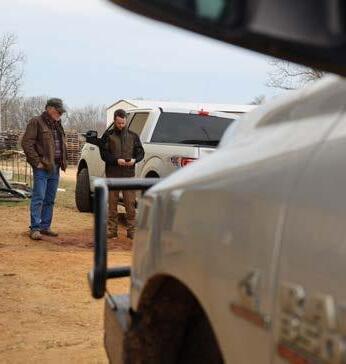
SBI: On the Case of Rural Crime
hardest to recover, Chapman said.
“I don’t have a conviction on cattle theft,” Chapman said. “If they’re not branded or tagged, there’s no way to definitively say, ‘That’s my cow.’”
 By Marlee Jackson
By Marlee Jackson
When Special Agent Chase Chapman was approached for this piece, he didn’t have a cracked case at the ready — a locked-up ring-leader responsible for scads of rural crime.
Just days later, the State Bureau of Investigation (SBI) began closing in on the source of a cross-county, multi-year string of robberies that cost farmers and rural residents thousands in stolen trucks, trailers and tractors.
“We’ve always treated it as one to three people, but early last year, we figured out it was a big, organized group,” Chapman said in January while visiting with Billy and Will McCurdy on their Lowndes County cattle farm. “When we started talking about this article, that next Wednesday, we interviewed a subject who confessed to taking trucks and trailers from this location and started naming people.”
As of press time, SBI was even closer to busting the ring.
It’s a series of organized crimes that started nearly a decade before the McCurdys’ case began in fall 2021.
That night, Billy raced to the farm
after the shop alarm tripped. When he arrived and saw the locked gate was removed from its hinges, he called Will.
Will dialed 911, then called the local sheriff. It was the right move per Alabama Law Enforcement Agency (ALEA) protocol, said Chapman.
SBI is ALEA’s investigative, non-uniform arm. It includes seven regions of officers, like Chapman, tasked with assisting local law enforcement personnel with rural crimes. After filing local reports, victims can report suspicious activity anonymously by emailing sbi.investigations@alea.gov or calling 855-75-CRIME.
SBI agents then assist local agencies. The biggest boon comes when officers start talking, piecing together similar cases and crimes. That’s what happened late last year, Chapman said.
“It’s a game to these criminals,” he said. “They talk back and forth on their phones and send pictures.”
Those snapshots focus on trailers. That’s their real target, Chapman said, though the alleged criminals often take trucks, too, to move stolen goods. Rural thefts run the gamut from ATVs to welding equipment. But livestock is the
Back in Lowndes County, after officers took initial statements, the McCurdys were realistic, believing their property was likely gone for good.
Then their luck turned.
“I was on the phone ordering two new trucks out of Georgia and got a call saying they’d been found,” Will said.
One Dodge was parked across from Montgomery’s Normandale Shopping Center. Another was recovered off a dirt road in Autauga County with the motor and transmission ripped out, while their feed truck was abandoned off Coosada Parkway. Out of four stolen trailers, just one was retrieved.
“We end up finding some goods by chance,” Chapman said. “They look like they don’t belong. Others are hidden in plain sight, like at truck stops, but the VINs aren’t legitimate.”
Chapman, also a farmer, connects with rural residents’ challenges. While locking up equipment and adding alarms or cameras isn’t foolproof, it’s a strong start, he said.
And if the worst happens, asking SBI for extra assistance is a solid next step.
“I like to help because I know what this feels like,” Chapman said. “Just reach out. We’re here to help.”

REPORT Rural Crime 1. Call 911 and file a local report. 2. Follow up with SBI by emailing sbi. investigations@alea.gov or calling 855-75-CRIME. alfafarmers.org March/Spring 2024 | NEIGHBORS | 23
SBI Special Agent Chase Chapman, right, updated Lowndes County farmer Billy McCurdy on an ongoing investigation in early January. Three trucks, including a silver Dodge (inset photo), and one trailer were recovered after thieves broke into the farm in fall 2021.
Cotton, Relationships and Extension: The Story of Ron Smith
 By Katie Nichols
By Katie Nichols
Science-based recommendations and replicated research are touchstones of the Extension mission, but research findings would have a limited reach without relationships.
Ron Smith, who has been an Alabama Cooperative Extension System entomologist for more than 50 years, said his Extension career would be empty if not for personal connections.
“It’s all about relationships,” Smith said. “Our job as Extension professionals is to take research, recommendations and experience to farmers as a
package. We should be in a position where they trust our word and trust our recommendations. Without that foundational trust, we are not doing our job to the fullest.”
Smith, who is heading into his 53rd cotton season as an Extension entomologist, said relationships are part of what got him to season 53.
Building Relationships
As an Auburn doctoral student, Smith met fellow Ph.D. student Richard Davis. The two played intramural basketball together and developed a friendship that wound up in Alabama cotton fields.

“In the early days, we enjoyed intramural sports, but we really worked together to serve Alabama farmers as we entered the workforce,” Davis said.
Davis spent two years as an Extension entomologist in 1976 and 1977. Shortly after, he made a move to private consulting in Montgomery and has spent nearly 50 years
serving Alabama farmers as a cotton consultant.
Barry Freeman succeeded Davis as Alabama Extension’s entomologist in the Tennessee Valley. A Georgia native, Freeman worked with Smith for almost 40 years.
“Having friends and colleagues like Ron and Richard made a big difference when we were all working to educate farmers and make sound management recommendations,” Freeman said.
These men were well known in the Alabama agricultural sector. That’s why Brad Meyer, an agronomist with GreenPoint Ag, considers himself lucky to have gained practical, hands-on experience with Davis and Smith through his undergraduate years. Meyer also met and learned from Freeman when he began work in north Alabama.
Meyer said he gleaned a foundational principle from his mentors: Relationships are everything.
“The age of exposure and social media has changed a lot of things, but people in agriculture want one-onone contact with representatives to feel comfortable with decision-making and sales,” Meyer said. “A handshake and smiling face go a long way when farmers are making decisions about their livelihood.”
Looking Forward
Smith said part of the draw of continuing his work with cotton entomology is the colleagues, counterparts and friends.
“I’ve retired three times and unretired four times — so that makes me currently unretired,” Smith said.
He noted the key to staying in the game as a cotton consultant or cotton entomologist is to continually look for the next tidbit that can make a tangible difference for producers.
“I’ve reached a point in my career where I consider all of the cotton growers in Alabama my friends,” Smith said. “My favorite part of this job has always been helping my friends manage their cotton.”
24 | NEIGHBORS | March/Spring 2024 alfafarmers.org
From left are Richard Davis, Ron Smith, Barry Freeman and Brad Meyer. Smith has worked with Alabama farmers for decades.

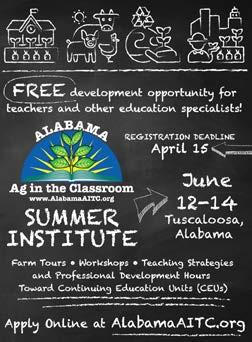
NOTICE OF ANNUAL MEETINGS OF ALFA MUTUAL INSURANCE COMPANY
ALFA MUTUAL FIRE INSURANCE
COMPANY
& ALFA MUTUAL GENERAL INSURANCE COMPANY
The annual meetings of the policyholder members of Alfa Mutual Insurance Company, Alfa Mutual Fire Insurance Company and Alfa Mutual General Insurance Company will be held at the Executive Offices of the Company, 2108 East South Boulevard, Montgomery, Alabama, 36116, on March 25, 2024, at 8:30 a.m., to consider and act upon the following:
1. To elect Directors in accordance with the Bylaws.
2. To transact such other business as may properly come before the meeting or any adjournment thereof.
The record date fixed for determining members entitled to vote at said meeting is the close of business on February 7, 2024. If a member has authorized the Company’s Board of Directors to vote as his/her proxy at said meeting and wishes to revoke such proxy, such member may do so by written notice to the Secretary of the Company, by registered mail to the address set forth above, at least 10 days prior to said meeting.
— Angela L. Bradwell, Secretary
alfafarmers.org March/Spring 2024 | NEIGHBORS | 25
 By Maggie Edwards
By Maggie Edwards

FMiss Auburn University Rooted in Agriculture
arm life paved the road to the crown for Miss Auburn University (AU) Mary-Coker Green.
“A farmer works hard to put seeds in the ground they aren’t guaranteed will grow,” said Green, the daughter and granddaughter of Mobile County farmers Danny and Monica Green and Charles Turner. “There is a blind faith of being willing to put in the work that the Lord has called you to do without knowing if you are going to reap any benefits.”
Green cultivated that understanding on her family’s cattle, vegetable and cut-flower farm in Citronelle, with stops in her childhood including Hoover and Pensacola, Florida.
“I spent a lot of time in the garden,” said Green, 20. “I would build fences, feed animals, get eggs in the morning. I’ve even pulled a few calves. There is a multitude of ways farm life has impacted me, but my work ethic is the main thing.”
Green’s grit and gumption doesn’t stop on the farm.
As Miss AU, she will represent the university in the Miss Alabama scholarship competition this summer. Last year, Green placed in the Top 13. Contest categories include fitness, interview, red carpet walk, talent (Green plays the fiddle) and a social impact initiative. The latter highlights Green’s nonprofit, Engage: Building Healthy and Resilient Minds.
Double majoring in agricultural business & economics and public relations, Green aspires to represent organizations and companies larger than herself.
“Public relations stood out because the ability to take someone’s mission and goals and spread it to the world is important,” Green said. “The audience that piqued my interest was the agricultural industry.”
At age 13, Green’s life shifted as she began competing in the Miss America
Organization’s teen program. More changes came when she experienced a life-altering car wreck her senior year of high school.
Through that, she learned to approach trauma with grief and gratitude. She credits the Miss America Organization with giving her skills — like confidence — to face her fears, start her nonprofit and write a book, “The Girl Who Grew A Garden.”
“The book focuses on a little girl who grew up on a farm, much like me,” said Green while flipping through the book’s colorful pages. “She is given a sunflower seed, watches it grow and falls in love with it, but as all flowers do, it wilts away. Toward the end, she sees that the head is filled with other seeds and gets to choose the act of grieving or spreading joy.”
“The Girl Who Grew A
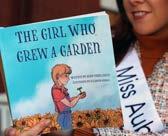
Miss Auburn University Mary-Coker Green finds joy in telling her life’s story, including a rich childhood on her family’s Mobile County farm. Her book, “The Girl Who Grew A Garden,” is available on Amazon. Green will compete in Miss Alabama this summer.

Garden” (available on Amazon) ties in with her nonprofit, which educates and engages citizens about trauma recovery and Green’s goal is to help younger girls understand it’s possible to choose a future beyond present circumstances.
Competing in Miss Alabama gave her that opportunity.
“Because of this organization, I have been able to interview and write resumes for scholarships,” Green said. “I have also received the Alabama Farmers Agriculture Foundation (AFAF) scholarship from the Alabama Farmers Federation. More than just financial funds, it has given me the ability to pursue the life I want.”
Green is a great example of the caliber of students who receive AFAF scholarships, said the Federation’s Matthew Durdin, who oversees the scholarship
“The Federation is proud to award scholarships to students who give back to the community,” Durdin said. “Mary-Coker has served many leadership roles at AU. She represents the mission of our organization and the agricultural industry. It’s inspiring to see young people with her work
Follow her journey to Miss Alabama

26 | NEIGHBORS | March/Spring 2024 alfafarmers.org
NICE GUYS
I’d like to make my mama proud.
That’s one of my main goals in this world. If I’ve made her proud, well, then I’ve really done something.
My mother, you see, is the kind of woman who taught me how to be nice and how to have manners.
Long ago, she would make me sit with my cousin Myrtle at covered dish socials so Myrtle wouldn’t be sitting alone. Mama would say things like: “Be polite, and make sure you ask your cousin how her baton twirling is coming along.”
Admittedly, Myrtle was about as interesting as watching ditchwater evaporate. But like I said, I want my mama to be proud.
Maybe I should back up and tell you where all this is coming from.
I recently spent some time with people who were — how do I put this? — not very nice. Now, they weren’t MEAN people, per se, but you don’t have to be “mean” to be un-nice.
I hope I am never an un-nice person. What would Mama think?
Mama is a woman who says things like: “Be a good listener. Your ears will never get you in trouble.”
I don’t aspire to much in this life, but I know that I want to be the kind of man who listens.
Also, I want to be the kind of man who dogs follow for no reason. I want to be the guy who does magic tricks for toddlers.
I want to go around reminding teenagers how important they are. I want to listen to the jokes old men tell when their wives aren’t around.
I want to hear long stories on porches, and I want to be the first to respond: “Well, I Suwannee.”

A good Suwannee is hard to find.
I want the “little guys” to be famous. I want the overlooked to be looked at. I want to clap for the kid who dreams of singing on the Opry stage one day — like Mama clapped for me.
I want to believe in people like she does. I want to watch sunsets with friends and convince them that they are the most SPECIALEST people in the world. And I want to use words like “specialest,” even though that word is English blasphemy.
I don’t need a New York strip, just give me a hamburger and onion rings as big as hula hoops. Then, I want you to know that you can hug me whenever you want and get a hug in return.
A good hug is harder to find than a good Suwannee.
And if I live long enough to see my own white hair, I want to be a man who is proud of people who don’t have someone to be proud of them.
I want my friends to succeed and surpass me. I want to be the one cheering for them in the bleachers. I want my funeral to be filled with people who say things like, “Sean Dietrich, wasn’t he a mess?”
And I want you to know you are magnificent.
Everyone and anyone. Landscapers, meter-readers, garbage men, abused spouses, ex-convicts, divorcees, jewelry artists, single mothers, lonely fathers, Mexican immigrants, nurses, attorneys, Waffle House waitresses, concrete layers, Baptists, insurance salesmen and even my cousin Myrtle.
I hope I am the sort of guy who is kind.
But most of all, I hope to make my mother proud. ■




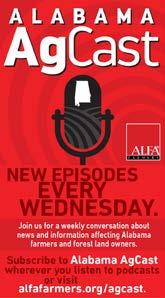
alfafarmers.org March/Spring 2024 | NEIGHBORS | 27

March is National Peanut Month, so of course, I feel this month was made just for me. Ever since I was a boy, the cooks in my family have known the way to my heart is anything that features peanut butter on the ingredient list. I’m sharing a couple classic peanut butter recipes and one soon-to-be classic with you. My hope is you’ll make all three sometime soon.
Peanut Butter Chess Pie combines a gooey, decadent classic pie recipe with sweet-and-savory peanut butter for an easy dessert that is sure to be an instant hit. I generally use a store-bought, roll-out pie crust, but you can certainly make your own. If you’re a big chess pie fan like me, this one will be love at first bite.
Peanut Butter Balls are sort of the Alabama version of a buckeye. They are

similar in taste but vary in appearance and, sometimes, ingredients. While purists may disagree, I like to add graham cracker crumbs for a slight crunch without taking away from the flavor everyone looks forward to. Plus, those added crumbs give this a taste and texture much like my favorite little peanut butter cups (you know them — and their orange and brown wrapper — well!). These freeze well, so it never hurts to make a double batch. They are great to keep in the fridge for quick lunchbox treats.
We have a delicious treat to round out our recipes this National Peanut Month. Alabama Farmers Federation family member Felicia Dewberry of Clay County is sharing her delicious Salted Peanut Chews. This old-fashioned treat took me back to childhood days in
Peanut Butter Chess Pie
Prep Time Cook Time Servings
15 mins 55 mins 8
Ingredients
4 tablespoons unsalted butter, melted
1/2 cup creamy peanut butter
1 (5-ounce) can evaporated milk (about 2/3 cup)
2 large eggs, room temperature, lightly beaten
3 tablespoons cornstarch
1 1/2 cups sugar
1 teaspoon vanilla
1 (9-inch) unbaked pie crust
Instructions
Heat oven to 350 F. In a large bowl, stir together melted butter and peanut butter. Add evaporated milk and eggs, then stir to combine. Add cornstarch, sugar and vanilla. Stir until smooth.
Pour mixture into the unbaked pie crust, being cautious not to over-fill. Bake 45 to 55 minutes or until a crust has formed completely across the top. It will look like a peanut butter cookie, and there might still be a little jiggle to the pie. Allow to cool completely before slicing. Serve with a dollop of whipped cream, if desired.
Grandma’s kitchen, and I bet it will bring back cherished memories for you, too. If not, it will surely help you make new ones. Felicia’s peanut-packed recipe placed in the 2011 Heritage Cooking Contest and was originally featured in that year’s October Neighbors.
Spring is on its way, and we couldn’t be happier to see it coming. The Littles are wishing you all sunny skies, green fields and love of family and friends.
Until next month,

Stacey

Stacey Little is a foodie, recipe developer and cookbook author whose Southern Bite blog helps families put simple, down-to-earth food on the table while preserving Southern cooking for future generations. See more recipes at southernbite.com.
28 | NEIGHBORS | March/Spring 2024 alfafarmers.org
Salted Peanut Chews

 By Felicia Dewberry, Clay County
By Felicia Dewberry, Clay County
Prep Time Cook Time Makes 20 mins 25 mins 36 pieces
Ingredients
For the crust:
1 (15.25-ounce) box yellow cake mix
1/3 cup butter or margarine, softened
1 egg
3 cups mini marshmallows
For the topping:
2/3 cup light corn syrup
1/4 cup butter or margarine
2 teaspoons vanilla
2 cups peanut butter chips
2 cups rice crispies
2 cups salted peanuts




Instructions
Heat oven to 350 F. Using an electric mixer, combine cake mix, butter and egg on low until crumbly. Press into bottom of an ungreased 9-inch-by-12inch pan. Bake 15 to 18 minutes or until light brown. Remove from oven and sprinkle with marshmallows. Return to oven for 1 to 2 minutes or until marshmallows are puffy. Cool.
In a large pot over medium-low, heat corn syrup, butter, vanilla and peanut butter chips until chips are melted and smooth, stirring constantly. Remove from stove, then stir in cereal and peanuts. Spoon and spread over marshmallows. Cool before serving.


Peanut Butter Balls
Prep Time Makes 45 mins 60 pieces
Ingredients
1 1/2 cups creamy peanut butter
1 cup unsalted butter, room temperature
4 cups powdered sugar
1 1/2 cups graham cracker crumbs
1/2 teaspoon salt
1 to 2 (16- to 24-ounce) packages chocolate almond bark or candy coating
Instructions
butter, butter, powdered sugar, graham cracker crumbs and salt.
tablespoon of the mixture into a tight ball. Place on a baking sheet and refrigerate about 30 minutes.
package instructions. Use two forks to roll each ball in the chocolate and tap off excess before placing them on a large sheet of wax or parchment paper. Work in batches, keeping the rest cool in the

first five ingredients, but I
IT ON alfafarmers.org March/Spring 2024 | NEIGHBORS | 29
SEE
Perennial Plants: Divide and Conquer
 By Dani Carroll
By Dani Carroll
Perennial plants are some of my favorite workhorses in the garden. What’s not to love about planting something once and watching it return to its colorful glory year after year?
A perennial has its tops (foliage, stems and flowers) killed by winter weather but will have renewed growth every year from the surviving roots and crown. There are perennials for everyone and every place. These plants can have different sun and shade needs, heights and spreads, water needs, bloom colors and bloom times.
Perennial plants still need a little help in the landscape each year. Other than weeding, deadheading, watering and fertilizing, it may be time to consider dividing the plants.
Why Divide?
Dividing perennial plants is not necessary every year. However, this is a great season to look at your landscape to decide if it is time to divide.
Perennial plants that have multiplied and become too large for a space can be divided and shared with other gardeners or moved elsewhere in the
landscape. These long-lasting plants may not flower as well after they become crowded in an area. Gardeners may even find the center of perennials become sparse while newer growth begins around the edges. This is a sign the perennial is overcrowded and needs to be split.
Dividing Details
Dividing perennials is easy. A good rule of thumb is to start dividing summer- and fall-blooming perennials in the early spring, as soon as they start showing new shoot growth. (March is a good time.)
We all get excited when we start seeing new shoot growth in late winter and early spring, signaling the start of the colorful blossom that will top the shoots months later. Dividing and replanting now will give the roots of those summer and fall bloomers a great chance to become established before summer heat kicks in. For spring and winter bloomers, divide after blooming or in the fall.
When dividing perennials, dig up or raise entire clumps. A pitchfork or square shovel works well. Gently raise the clump from the soil. I use a knife
or pruners to remove roots or parts of the plant that do not look healthy. With coneflowers, I divide the clumps once they are raised from the ground so each division has two or three spots of new shoot growth. Plant the divided pieces in different places that same day. If there is not room for them, planting them in small containers and sharing makes for happy gardener friends.


30 | NEIGHBORS | March/Spring 2024 alfafarmers.org
Early spring is a great time to divide summer- and fall-blooming perennials. This helps establish the plants before summer’s heat kicks in.




YOUR SOYBEANS ARE GOING

The beans in your Alabama fields today are destined to see the world. Last year, we exported $83.8 million worth of soybeans. That’s a lot of overseas opportunity for one year. And we’re always growing new markets abroad to help keep this demand going strong. And if you’re wondering how far your soybeans can go, we’re charting more ways to keep your ship coming in. Learn more about the story of soy at unitedsoybean.org/hopper.

Source: U.S. Department of Agriculture Economic Research Service. ©2023 United Soybean Board. [62728-4 5/23] INTERNATION
AL





 Photo By Marlee Jackson
Photo By Marlee Jackson






 By Maggie Edwards
By Maggie Edwards



 Clockwise from top right: LCFF President Jeff Peek visits the Athens Farmers Market; Athens’ mural celebrates agriculture; Alabama Farmers Federation Area 1 Organization Director Barrett Gilbert and Wes Isom visit at U.G. White Mercantile; The old-timey store displays
Clockwise from top right: LCFF President Jeff Peek visits the Athens Farmers Market; Athens’ mural celebrates agriculture; Alabama Farmers Federation Area 1 Organization Director Barrett Gilbert and Wes Isom visit at U.G. White Mercantile; The old-timey store displays






 By Tanner Hood
By Tanner Hood




















 By Marlee Jackson
By Marlee Jackson



 By Brooke Foster
By Brooke Foster

 Cottonwood Animal Clinic experienced significant damage Jan. 9 when a tornado destroyed the front part of the building.
Dothan Alfa Agent Robert Johnson was quick to answer the call and check on his customers after a tornado tore through Houston County Jan. 9.
Cottonwood Animal Clinic experienced significant damage Jan. 9 when a tornado destroyed the front part of the building.
Dothan Alfa Agent Robert Johnson was quick to answer the call and check on his customers after a tornado tore through Houston County Jan. 9.











 By Maggie Edwards
By Maggie Edwards
























 By Marlee Jackson
By Marlee Jackson

 By Katie Nichols
By Katie Nichols



 By Maggie Edwards
By Maggie Edwards













 By Felicia Dewberry, Clay County
By Felicia Dewberry, Clay County





 By Dani Carroll
By Dani Carroll







